
AC/E Digital Culture Annual Reports
The AC/E Digital Culture Annual Report 2026 is a reference work that analyzes the intersection between technology and the cultural sector, focusing on the challenges of cultural production, distribution, and preservation in the era of AI and digital fragmentation. The core of the report is FOCUS 2026, titled Cartography of the Use of AI in Spanish Digital Creation. This key study details how Artificial Intelligence is redefining creative processes and markets in Spanish-speaking fields such as visual and performing arts, film, books, music, and video games. The objective is twofold: to describe the generative AI tools and methodologies adopted by the Spanish-speaking cultural industry and to examine the opportunities, emerging formats, and ethical and economic challenges that this landscape presents for the global content market in Spanish.
The first part of the Annual Report complements the FOCUS with expert articles that address cross-cutting digital trends. Highlights include: the impact of AI geopolitics on linguistic diversity; the dilemma of algorithms regarding personalization versus cultural diversity; reflection on the authenticity of the facsimile and the urgency of finding new storage methods for digital culture; and the analysis of hybrid narratives, the devaluation of context in information, and the challenges of digitalization in sectors such as comics and video games. With this edition, the AC/E Digital Culture Annual Report maintains its goal of offering a strategic and future-oriented perspective for all cultural stakeholders.

Anuario AC/E de cultura digital 2025
La idea central del Focus de este año, desarrollada por la historiadora del arte y comisaria Mónica Bello, radica en la necesidad de profundizar en la colaboración entre agentes culturales, científicos y tecnológicos para abordar los desafíos actuales y futuros. A través de casos ejemplares y momentos transformadores, se destacan los valores que emergen del diálogo interdisciplinar, proponiendo modelos de colaboración orientados a la sostenibilidad, la viabilidad y, en última instancia, la innovación cultural y el bienestar común. Con un enfoque principalmente europeo y una aspiración global, este trabajo ofrece herramientas valiosas para instituciones interesadas en promover espacios creativos, diversos, inclusivos y comprometidos con la cultura.
Esta edición cuenta, además, con las reflexiones de diversos autores que exploran la intersección entre cultura y digitalización: Manuel González Hernández analiza la creatividad en la era de los algoritmos como un nuevo espacio creativo; Óscar Espiritusanto explora los «IAlogos», diálogos artificiales con inteligencias reales; Raquel C. Pico examina la relación entre la cultura y la Agenda 2030; Laura Ceballos aborda las estrategias globales para un consumo responsable de cultura digital y salud mental en jóvenes; Andrew Richard Albanese analiza la situación de editores, bibliotecas y la libertad de leer en Estados Unidos; Inés Abalo Rodríguez y Paco Calvo exploran la conexión entre la inteligencia de las plantas y la robótica del mañana; Nico Castro reflexiona sobre la transformación de los perfiles profesionales en la industria musical por la digitalización; Yova Turnes presenta el caso DeVuego en el camino hacia la catalogación y conservación del legado de los videojuegos y sus creadores; José Luis Reyes Criado analiza los festivales de música electrónica y artes digitales como eventos vitrina; José Ramón Alcalá reflexiona sobre la historia pendiente y la memoria en riesgo del New Media Art; y Sofía López examina la IA generativa y su impacto en la transformación de las industrias culturales creativas.
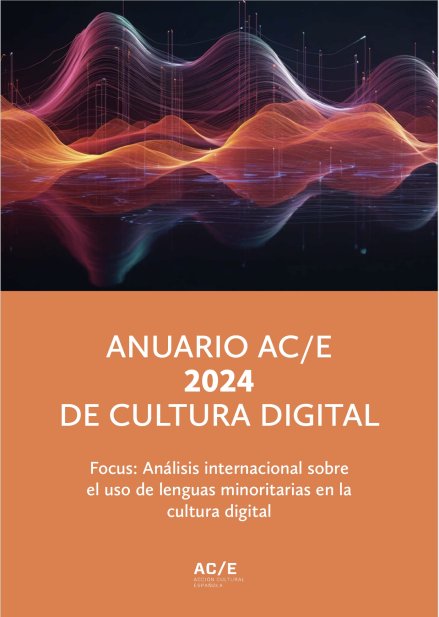
AC/E Digital Culture Annual Report 2024
The AC/E Digital Culture Annual Report presents its tenth edition with a Focus dedicated to analyzing the challenges and opportunities of minority languages in the digital era in which we live. Will new technologies help increase the production and consumption of digital cultural content in different languages or, on the contrary, will the Internet “kill” linguistic diversity by promoting the dominant position of global languages?
This report is accompanied by a set of texts that explore exciting and sometimes unexpected aspects of the digital world linked to culture, such as transhumanism whose historical roots, worldview and action program analyzes Alfredo Marcos, or the technology of deepfakes and its impact on the human voice that Eugenia San Segundo Fernández deals with. Mauro Canut reflects on the consequences of artificial intelligence in the music industry. Mariana Toro Nader does so in the field of digital archaeology, defining its objectives, methods and applications, as well as the challenges that archeology faces in the digital age and the opportunities offered by new technologies for the preservation and study of cultural heritage. Michael McLoughlin defends the status of video games as cultural and artistic products. Chema Galante analyzes the importance of digital literacy in today's world, a key competence for the 21st century. Bibiana Ricciardi explores the rise of the podcast as a new medium for cultural dissemination. And, finally, Maite Ortega exposes the evolution of collage as an artistic technique from its origins to the present, with a particular focus on its development in the digital age.
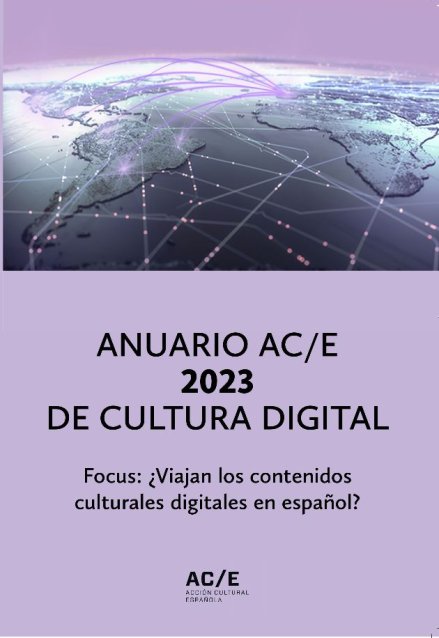
AC/E Digital Culture Annual Report 2023
This year's Yearbook analyzes in its first part, through six articles by specialists, current digital issues such as digital practices and SDGs, culture and its space, exponential technologies, the impact of new technologies on nature, culture on Tik Tok and on Twitch.
The Focus “Does digital content travel in Spanish?” makes an analysis, through an exhaustive study of the keys to the operation of digital cultural content in Spanish, the most demanded themes, its export to other markets and its transformation to other formats (music, books, audiobooks, movies, series of television, podcasts, video games, plays, etc.). This information has been reflected in various studies and partial articles from each of the cultural industries. This year's Focus carries out an exercise of aggregating results and a joint analysis to obtain the main keys on the journey of digital content in Spanish with the aim of providing relevant information and data on the consumption of culture in Spanish throughout the world to professionals in the cultural sector.
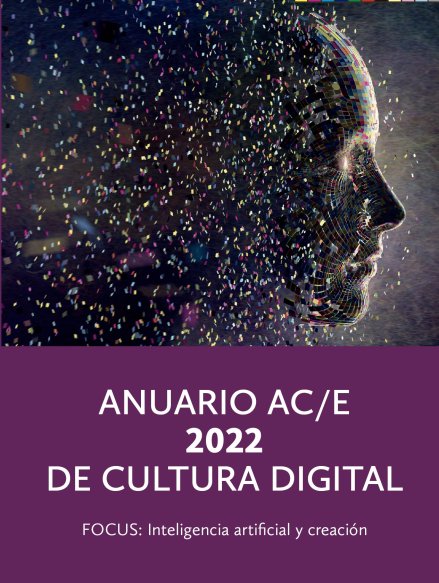
AC/E Annual Report of digital culture 2022.
These are some of the topics the articles address:
-Data for management and cultural analysis. - The transformation of libraries in the digital age.
-Technological countercultures and practices of techno-resistance.
- The NTFs in the world of culture allow the creation of digital works of art that are sold through these payment methods, as well as the management of copyright through this technology.
- The cultural Metaverse or what cultural experiences will be like in a metaverse world that is expected to have a great impact on our society in the coming years.
- Growing payment culture in the digital cultural world.
-The culture of creating and designing online, gives keys to both managers and creators of the latest trends and tools.
- The script behind everything. The role and evolution of the script as a support for all staging.
FOCUS 2020: Artificial intelligence and cultural creation
In recent years we have been seeing how the eruption of artificial intelligence is affecting all areas of artistic creation. New technologies, and in particular artificial intelligence, are drastically changing the nature of the creative process. Computers play a very important role in activities such as music, architecture, visual and performing arts, storytelling, and literature or cinema, among others. In fact, the computer is already a canvas, a brush or a musical instrument.
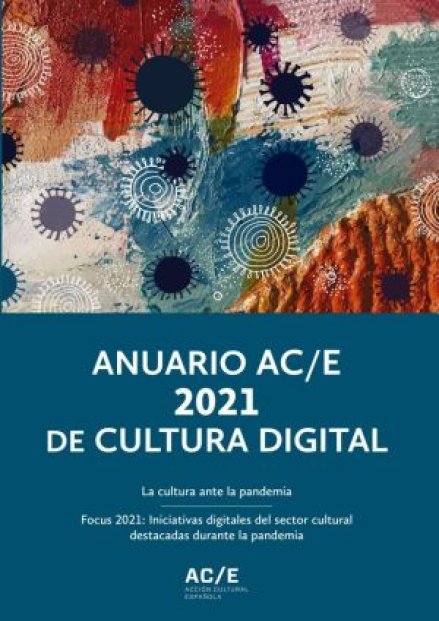
AC/E Digital Culture Annual Report 2021
The edition for 2021 includes a first part of essays in which professionals and specialists analyze how from different fields of culture (visual arts, cinema, music, performing arts, books and heritage ) digital technologies have been implemented to deal with the “new reality” that has emerged after the COVID-19 pandemic. The essays will include in their conclusions the forecasts of each expert in the short and medium term. As well as a point at which they propose which of the new tools and processes that we have learned to use as a result of this crisis can help implement the internationalization of the cultural sector in our country.
Focus 2021: Significant digital initiatives of the culture sector during the pandemic.
The study for the preparation of the Focus aims to compile and analyze the best practices related to the use of new technologies by various national and international cultural entities that, during the COVID-19 pandemic, are aiming to culture continues to be present in our lives, even during the harshest stages of confinement.Through this analysis, professionals from the world of culture will discover a broad description of the most innovative applications of new technologies to facilitate access to culture, despite the current health problems. Ideas that were used during the limitations derived from confinement and the new situation of health prevention, but that can become permanent tools that, in the future, complement the activities of any cultural entity to reach more audiences through technology.
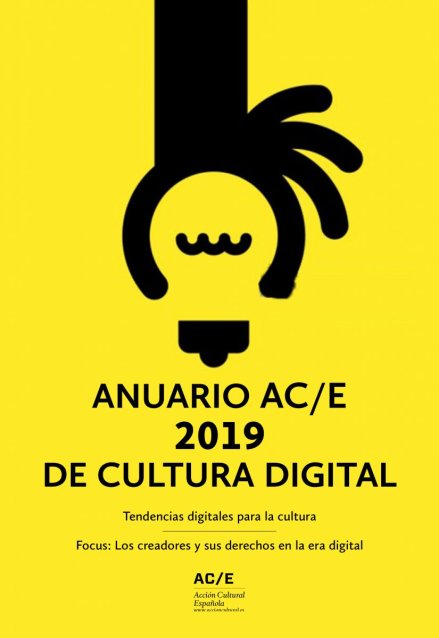
AC/E Digital Culture Annual Report 2019
First part. Analysis of trends
Eight articles written by specialists explore issues such as the algorithms that provide us with cultural consumption and are diminishing our capacity for surprise. They also examine data collection and loss of privacy, the social struggle vis-à-vis the use and abuse of data, the new types of ownership, identity and belonging that this new digital age is bringing, open access and creators’ rights, the legal limbos of new spaces with digital content such as podcasts, portability, digital heritage and the development of Blockchain for culture. In addition, in order to carry on fostering the dissemination of culture over the Internet, we take a look at the latest trends in the use of artificial intelligence in the music sector.
Focus 2019: Creators and authorship in the digital age
This section contains an exhaustive analysis of how distinctive national and regional systems reconcile new objectives in terms of access to works and cultural heritage. It also surveys the regulatory frameworks for creative platforms and for the exchange of visual, audiovisual, musical and literary artworks based on collaboration, innovation and openness.
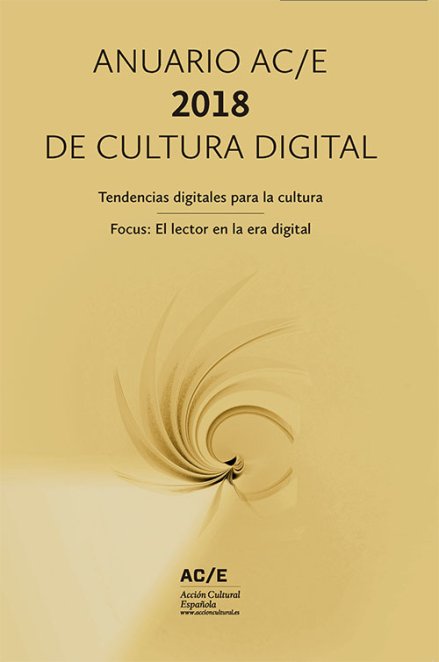
AC/E Digital Culture Annual Report 2018
First part. Analysis of trends
The first part of the 2018 edition brings together texts from professionals in the arts and culture sector as well as from experts in the digital field, in order to get up to speed on important issues regarding main trends. Mario Tascón takes a close look at our most connected cities that have been created by the latest interconnected devices and the Internet of Things. Next, José Manuel Menéndez and David Jimeno Bermejo describe the latest challenges faced by immersive technologies and its growing role within the ecosystem of digital content. The Experimental UNIT of the University of Valencia reviews its experience with the use of digital design. Jovanka Adzic discusses a burning issue. In her analysis of the evolution of social networks and their continuously expanding influence on our way of life, she also takes a look at the problem of fake news on the internet. Elena Neira takes a look at the impact of consumption of on-screen culture and the business models that are based on subscriptions— the so-called “Netflix model”. And Emma Rodero – in line with this year’s central theme of Focus – examines the theme of orality and analyses the growing influence of sound and voice in the digital era. Pablo Gervás builds on the concept of computational creativity and its impact on literary creation.
Focus 2018: Readers in the digital age
The second part of the edition reflects and explains – through the use of best-practice examples both nationally and internationally – the biggest changes happening among readers and reading material in the digital era. The main objective of this section is to present a unified view on the matter. Authors Luis Miguel Cencerrado, Elisa Yuste, and Javier Celaya outlines a map to help us navigate with ease through all types of texts; highlighting the role of the reader in the current context of hybrid literature (paper, digital, audio, visual, transmedia, etc.) which is favoured by the digital era we live in.
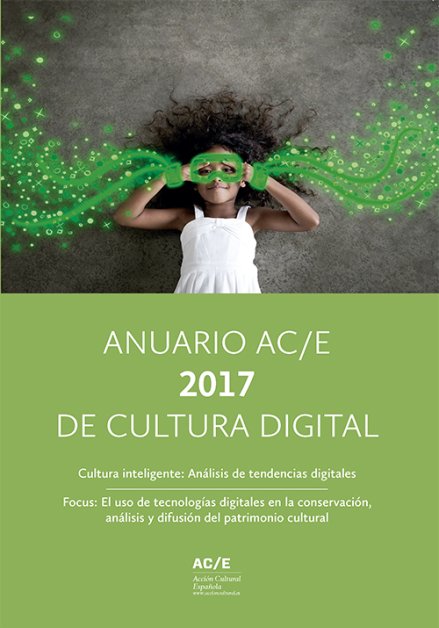
AC/E Digital Culture Annual Report 2017
First part. Analysis of trends
This first part is an update on digital trends in the world of culture or trends in the digital world that are applicable to culture, through several monographic articles by prominent experts. From content curation to deal with digital over-information; neuroscience applied to technology to quantitatively understand the emotions that art produces; the latest advances in artificial intelligence, the Internet of Things and Big Data applied to culture; Storytelling to give meaning to the cultural experience; the use of technology in music; and the design of video games for cultural expression and digital literacy.
Focus 2017: The use of digital technologies for the conservation, analysis and dissemination of cultural heritage
The use of digital technology to conserve, analyse and disseminate cultural heritage is growing fast, leading to radical changes in methodologies and formats. Augmented reality to reconstruct archaeological sites, virtual reality to provide immersive experiences in historical contexts, the use of 3D printing to duplicate and preserve works of the past, drones, GPR and satellite imaging for archaeological prospecting, and 3D imaging to recreate contexts and disseminate historic heritage are some of the fields the study examineS in order to familiarise sector professionals with the most innovative experiments and where they are being carried out.
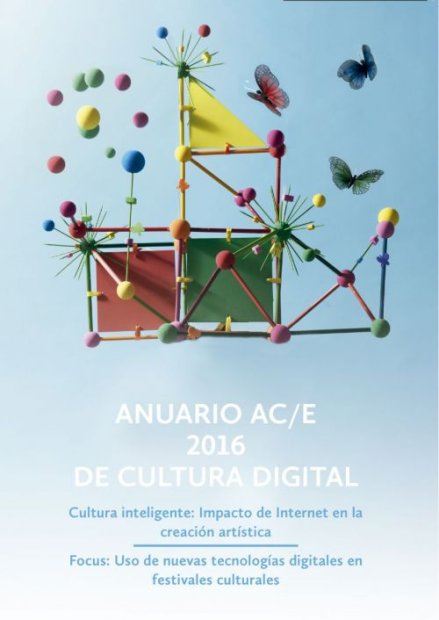
AC/E DIgital Culture Annual Report 2016
First part. Analysis of trends
The 2016 AC/E Annual Report examines how new technologies are transforming cultural creation: What new languages are available to creators for telling a story? What role do new technological platforms play in creating a story? What is the process of producing a work in the twenty-first century? What impact does open content have on the ownership of a work? What role does the culture industry play in all this new creation process? How is a transmedia work marketed? How can the economic effort be made profitable? How is a work of these characteristics disseminated?
Focus 2016: The use of new technologies in organising and promoting culture festivals
To make it easier to consult, this year’s focus section identifies and systemises the use of new technologies in organising and promoting culture festivals (film festivals, music festivals, book fairs, art fairs and theatre festivals, etc.). The AC/E Annual Report aims to describe the technological formulas the organisers of these events are adopting to enrich participants’ experience.
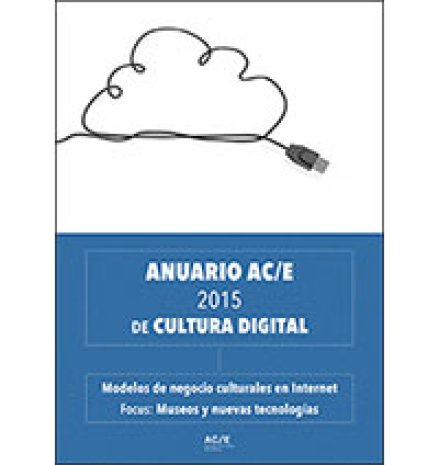
AC/E Digital Culture Annual Report 2015
First part. Analysis of trends
The first part features twelve articles by specialists who carry out cross-cutting analyses of the challenges, trends, business models and key aspects to be considered (legal, social, economic, etc.) in order to foster a culture of payment of cultural content on the Internet. The authors include Rodolfo Carpintier, Pepe Cerezo, Joana Sánchez, Marta Rodríguez, Hugh Forrest (SXSW), Matthew Caines (The Guardian Professional Cultural Network) and Juan Mateos García (NESTA).
Focus 2015: Museums in the digital age
The second part of the Focus consists of an exhaustive study of the museum sector through cases of good practice in the use of the latest digital trends. The study includes both success stories identified by us through a detailed analysis of the sector within and outside Spain, as well as the most significant among those submitted in response to the invitation published on our website between November and December 2014.
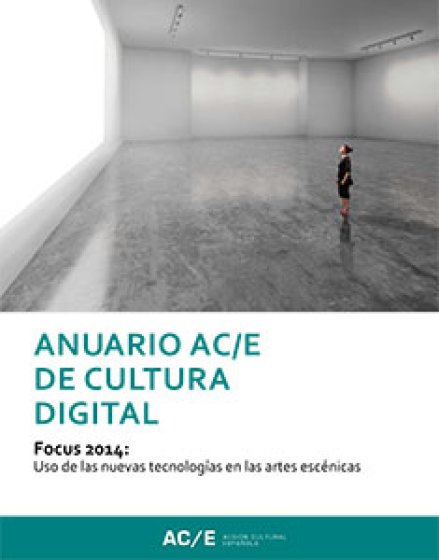
AC/E Digital Culture Annual Report 2014
First part. Analysis of trends
The report features nine opinion pieces that analyse the main technological trends from a highly cross-cutting approach that can be applied to any type of cultural institution. The cross-cutting technological trends analysed this year range from the impact of the new concepts of ‘gamification’, ‘transmedia storytelling’ and ‘crowdfunding’ in the cultural sector to highly topical issues such as cloud culture, how to sell culture over the internet and the role of the social networks in promoting culture, among others.
Focus 2014: Use of new technologies in the performing arts
The second part analyses the incorporation of new technologies into many areas of the performing arts: from production and promotion to distribution and including creation and staging, among others. For this purpose we have identified and studied success stories and cases of good practice at the national and international levels in order to familiarise professionals of the performing arts with the possibilities that new technologies can offer their institutions and the digital trends they will need to bear in mind over the coming years.
